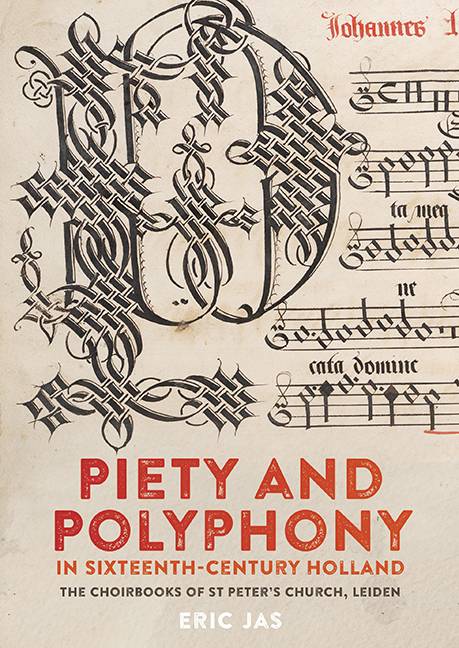Book contents
- Frontmatter
- Contents
- List of Illustrations
- Preface and Acknowledgements
- List of Abbreviations
- Introduction
- 1 The Zeven-Getijdencolleges
- 2 The Seven Hours in St Peter's Church at Leiden
- 3 The Choirbooks of St Peter's Church
- 4 The Repertoire of the Choirbooks
- Epilogue
- Appendix 1 Archival Documents
- Appendix 2 Descriptions and Inventories of the Choirbooks
- Appendix 3 Watermarks
- Alphabetical List of Compositions
- Alphabetical List of Composers
- Concordant Manuscripts and Printed Editions
- Bibliography
- Index
- Studies in Medieval and Renaissance Music
- Frontmatter
- Contents
- List of Illustrations
- Preface and Acknowledgements
- List of Abbreviations
- Introduction
- 1 The Zeven-Getijdencolleges
- 2 The Seven Hours in St Peter's Church at Leiden
- 3 The Choirbooks of St Peter's Church
- 4 The Repertoire of the Choirbooks
- Epilogue
- Appendix 1 Archival Documents
- Appendix 2 Descriptions and Inventories of the Choirbooks
- Appendix 3 Watermarks
- Alphabetical List of Compositions
- Alphabetical List of Composers
- Concordant Manuscripts and Printed Editions
- Bibliography
- Index
- Studies in Medieval and Renaissance Music
Summary
THE choirbooks from Leiden are a unique set of manuscripts. Ever since their reappearance in the second half of the nineteenth century they have been known as a rich source for the music of such composers as Thomas Crecquillon, Clemens non Papa and many of their earlier and contemporaneous colleagues. Thanks to great strides forward in the field of manuscript and repertory studies since the mid-twentieth century, it has been possible to develop an increasingly detailed picture of all the compositions that were copied for, and sung in, St Peter's. It has also been possible to ascertain that the six manuscripts were copied in Leiden between c. 1545 and 1565, and that materials were added to them up to the beginning of the Reformation in 1572.
But what is even more fascinating is that the study of these bulky manuscripts has opened a window onto piety, liturgy and musical life in the fifteenth- and sixteenth-century northern Netherlands. The manuscripts may date from the mid-sixteenth century, but the organization that ordered them had a much older tradition. This organization, the zeven-getijdencollege, had it roots in fifteenth-century piety, which was deeply concerned with contemplation of the afterlife. This fascination with life after death, combined with an element of pride and envy among cities and churches, resulted in numerous foundations illustrating the involvement of Leiden citizens in liturgical ritual and musical splendour. The initiatives of the citizens were recognized by the town's magistrate, which further supported liturgical and musical life, leading to one of the first instances of subsidized music education in the Low Countries. Music, both chant and polyphony, played its part in memorial services and in the daily hours, which was quite novel for a fifteenth-century parish church. A group of singers was formed, and the boys of the local Latin school were also involved in the performance of chant and polyphony. This tradition continued until the Reformation – and not only in Leiden, but also in numerous other towns in the province of Holland. Similar foundations are found in such major cities as Alkmaar, Amsterdam, Haarlem, The Hague, Gouda, Delft, Rotterdam and Goes. The documents regarding these getijdencolleges clearly show that Leiden was not exceptional.
- Type
- Chapter
- Information
- Piety and Polyphony in Sixteenth-Century HollandThe Choirbooks of St Peter's Church, Leiden, pp. 196 - 197Publisher: Boydell & BrewerPrint publication year: 2018

